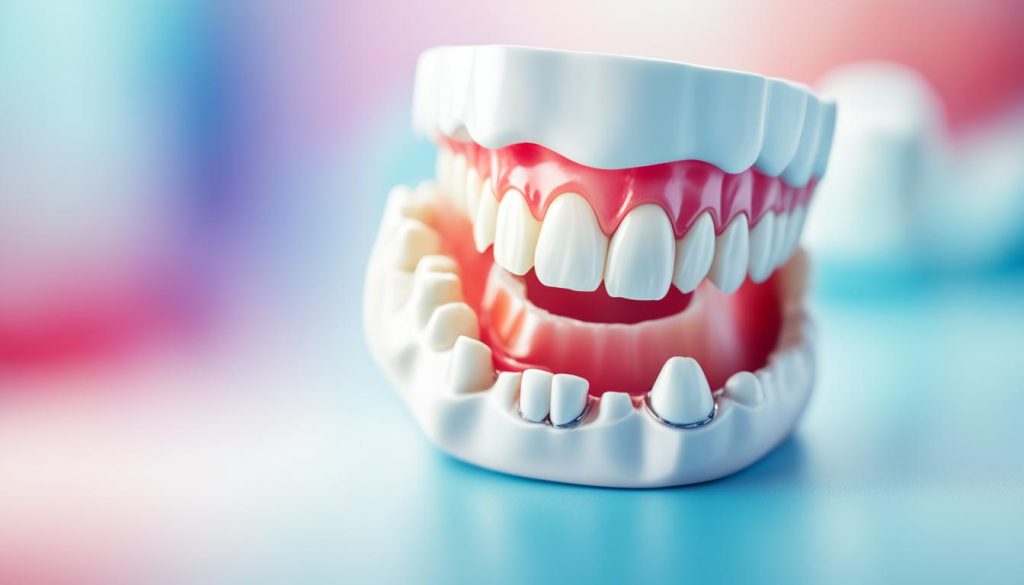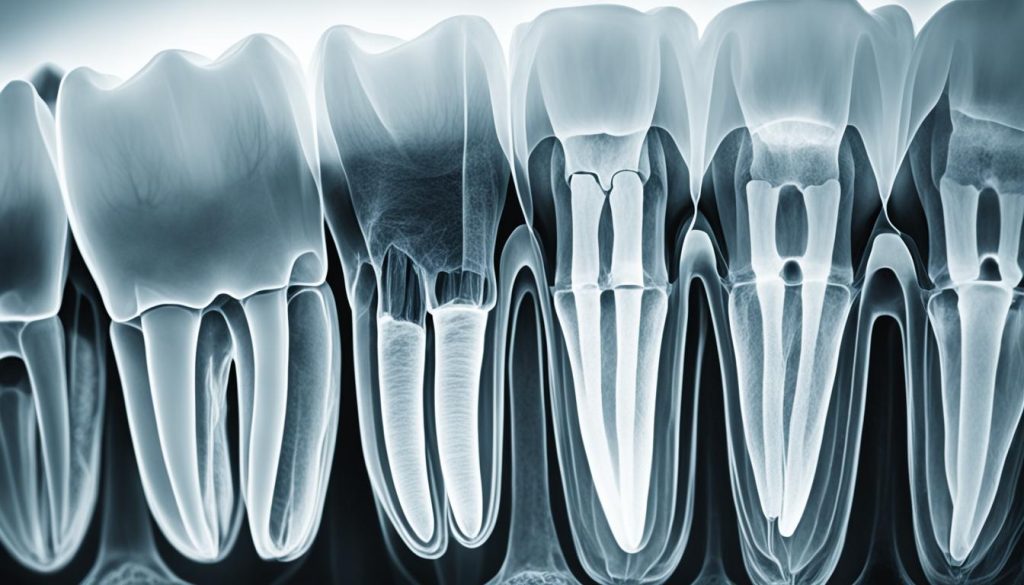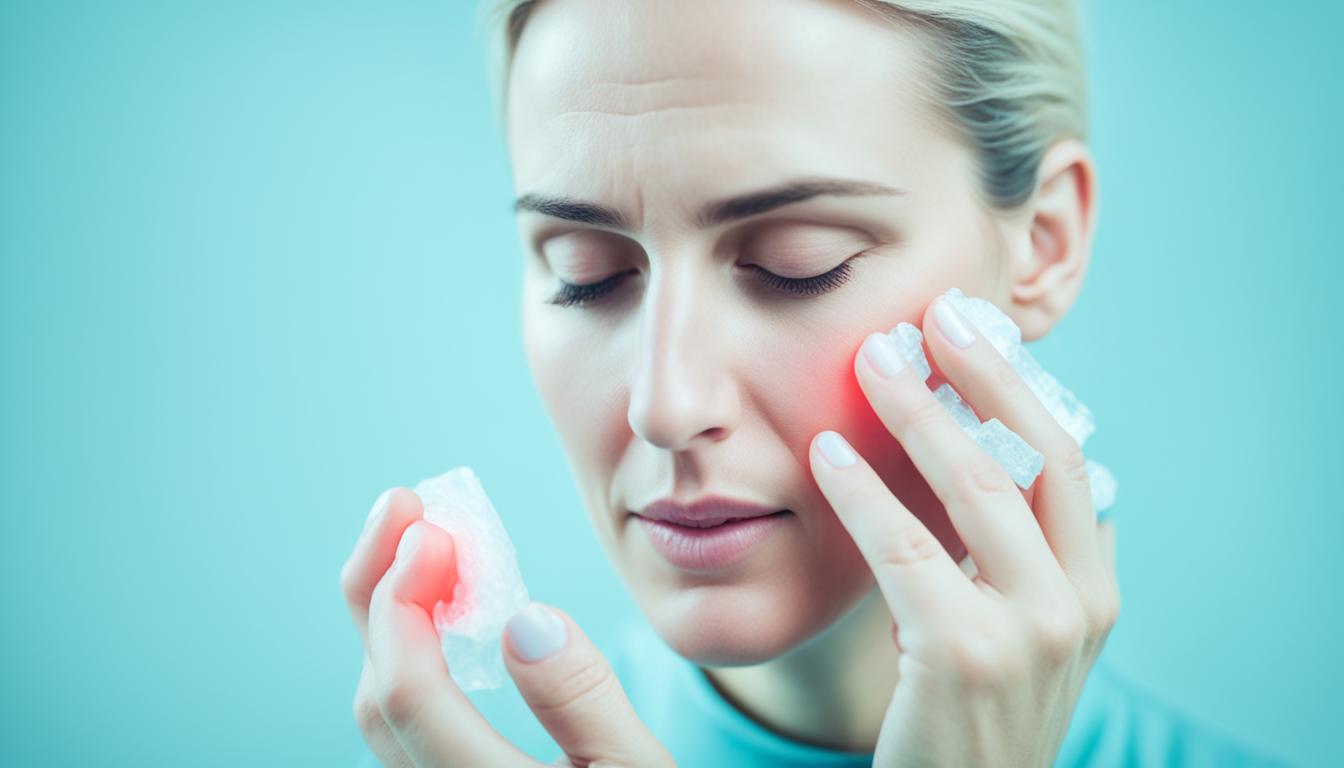Are you experiencing gum pain in one spot in the back of your mouth? If so, you’re not alone. Gum pain, also known as gum soreness or gum discomfort, can be a common dental issue that many people face. It can cause localized gum pain that feels throbbing and uncomfortable. But what exactly causes gum pain in one spot in the back, and how can you find relief? In this article, we’ll explore the causes of this type of gum pain and provide you with some helpful relief options.
Why Does My Gum Hurt in One Spot in the Back?
Gum pain can have various causes, ranging from oral health conditions to hormonal changes and dental appliances. Gingivitis, which is inflammation of the gums, can lead to soreness, bleeding, and gum inflammation. Hormonal changes during pregnancy and menopause can also affect the gums and cause gum sensitivity. Dental appliances like braces or dentures can irritate the gums and lead to gum soreness in one spot in the back. Other factors such as canker sores, tobacco use, stress, and lack of oral hygiene can contribute to gum pain as well.
It’s important to address gum pain and seek appropriate treatment to prevent further complications. Proper oral hygiene, including regular brushing and flossing, can help maintain dental health and reduce the risk of gum pain. Professional dental care, such as regular check-ups and cleanings, is also essential for gum health. Additionally, there are various relief options available, such as over-the-counter pain relievers, hydrogen peroxide mouthwash, and gels for sore gums.
By understanding the causes of gum pain in one spot in the back and following good dental care practices, you can help alleviate the discomfort and promote healthier gums. Consult with a dentist for a proper evaluation, as they can provide personalized advice and treatment options for your specific situation. Remember, taking care of your gums is an essential part of maintaining your overall oral health.
Oral Health Conditions and Gum Pain
Gum pain can be caused by various oral health conditions. One common condition is gingivitis, which is characterized by inflammation and irritation of the gums. This can lead to soreness and bleeding. Other symptoms of gingivitis include receding gums, tender gums, bad breath, and puffy gums. Poor oral hygiene is often the underlying cause of gingivitis, so practicing good dental care, such as regular brushing and flossing, can help resolve these symptoms.
- Thrush is another oral health condition that can cause gum pain. It is a fungal infection that can lead to soreness and irritation in the gums. Oral thrush is typically treated with antifungal medications to clear the infection.
- Periodontitis is a more severe form of gum disease that can also contribute to gum pain. It is characterized by gum soreness, swelling, bleeding, and other symptoms. Treating periodontitis usually involves professional teeth cleaning to remove plaque and tartar buildup, as well as maintaining proper oral hygiene practices.
It’s important to address these oral health conditions promptly to prevent further complications and maintain optimal gum health.
| Oral Health Condition | Symptoms | Treatment |
|---|---|---|
| Gingivitis | Sore gums, bleeding gums, receding gums, tender gums, bad breath, puffy gums | Proper oral hygiene, regular dental care |
| Thrush | Sore gums, oral discomfort, white patches on gums and tongue | Antifungal medications |
| Periodontitis | Gum soreness, swelling, bleeding, gum recession | Professional teeth cleaning, proper oral hygiene |
Proactively addressing these oral health conditions and maintaining good oral hygiene habits can help alleviate gum pain and promote overall gum health.
Hormonal Changes and Gum Pain
Hormonal changes can have a significant impact on gum health, particularly in women. Fluctuations in hormone levels during different stages of life can lead to various gum issues, resulting in discomfort and pain. It’s essential to understand how hormonal changes can affect gum health to take appropriate measures for relief and prevention.
Puberty and Gum Sensitivity
During puberty, hormonal changes can cause increased blood flow to the gums, making them more sensitive and prone to inflammation. This can result in gum swelling, tenderness, and pain. Maintaining good oral hygiene, such as regular brushing and flossing, along with routine dental visits, can help manage gum discomfort during this period of hormonal change.
Pregnancy and Gingivitis
Pregnancy hormonal changes can lead to a condition called pregnancy gingivitis. This is characterized by gum soreness, bleeding, redness, and swelling. The increased levels of progesterone during pregnancy can make the gums more susceptible to plaque buildup and inflammation. Practicing thorough oral hygiene, including brushing, flossing, and using antimicrobial mouth rinses recommended by your dentist, can help manage pregnancy-related gum issues.
Menopause and Gum Changes
Menopause is another stage where hormonal changes can impact gum health. Decreased estrogen levels can cause changes in gum tissue, leading to symptoms such as gum bleeding, color changes, burning sensation, and gum pain. Maintaining good oral hygiene and regular dental visits can help manage gum discomfort during menopause. Your dentist may also recommend hormone replacement therapy or other treatments if necessary.
It’s important for women to be aware of these hormonal changes and their potential impact on gum health. Seeking dental care and practicing good oral hygiene can help manage hormonal-related gum pain and reduce the risk of developing more serious gum conditions. Remember, regular dental check-ups and consistent oral care are essential for maintaining healthy gums throughout different stages of life.
| Hormonal Changes | Gum Symptoms |
|---|---|
| Puberty | Gum sensitivity, swelling, tenderness, and pain |
| Pregnancy | Gum soreness, bleeding, redness, swelling |
| Menopause | Gum bleeding, color changes, burning sensation, pain |
Understanding the relationship between hormonal changes and gum pain is crucial for maintaining optimal gum health. By staying proactive with oral hygiene practices and seeking professional dental care, women can alleviate discomfort and ensure their gums stay healthy throughout their lives.

Dental Appliances and Gum Pain
Dental appliances, such as braces, dentures, retainers, and mouthguards, can sometimes cause gum irritation and lead to soreness. When these appliances are not properly fitted or if there is breakage, friction occurs, damaging the delicate gum tissue and resulting in gum discomfort. The friction caused by these appliances can leave marks on the gums, causing gum discomfort and irritation.
Chemicals present in cleaning solutions or adhesives used with dental appliances can also irritate the gums. It’s important to choose the right cleaning solution or adhesive that doesn’t cause chemical irritation. Switching to a different cleaning solution or adhesive may help alleviate gum discomfort.
To prevent friction and irritation caused by dental appliances, dental wax can be applied to create a protective layer between the appliance and the gums. Dental wax acts as a cushion, reducing the friction and relieving gum discomfort.
However, maintaining good dental hygiene practices is essential in managing gum discomfort associated with dental appliances. Regular brushing, flossing, and using mouthwash can help keep your gums healthy and minimize any potential irritation. Additionally, scheduling regular check-ups with your dentist can help address any appliance-related issues and ensure that your gum health is properly monitored and managed.
Here is a table summarizing different types of dental appliances and their potential effects on gum discomfort:
| Dental Appliance | Potential Effects on Gum Discomfort |
|---|---|
| Braces | Friction and marks on gums may cause gum irritation and discomfort. |
| Dentures | Improper fit or breakage can lead to gum irritation and soreness. |
| Retainers | Friction from retainers can cause gum discomfort and irritation. |
| Mouthguards | Improper fit or friction can result in gum soreness and discomfort. |
It’s important to remember that if you experience persistent gum discomfort or any other dental issues, it’s best to consult with a dental professional for personalized advice and treatment options.

Other Causes of Gum Pain
While there are common causes of gum pain like gum disease and oral health conditions, there are also other factors that can contribute to gum discomfort. Understanding these factors can help you identify the potential causes and take the necessary steps for relief.
Canker Sores
Canker sores are small sores that can develop in the mouth, including on the gums. These sores can cause tenderness and pain, making it uncomfortable to eat and speak. Although the exact cause of canker sores is unknown, they can be triggered by factors like stress, certain foods, and minor injuries to the mouth.
Tobacco Use
Smoking and tobacco use, including chewing tobacco, can significantly increase the risk of gum disease. The harmful chemicals present in tobacco products can irritate the gums, causing inflammation, soreness, and gum pain. Quitting tobacco use is essential for improving gum health and reducing gum pain.
Stress
Managing stress is crucial for overall health, including gum health. When you experience stress, your body releases cortisol, a hormone that can contribute to inflammation. Increased inflammation can affect your gums and lead to gum pain. Incorporating stress management techniques, such as exercise, meditation, and relaxation exercises, can help reduce the impact of stress on your gum health.
Lack of Oral Hygiene
Poor oral hygiene can contribute to gum pain. Inadequate brushing and flossing can lead to the buildup of plaque and bacteria, which can cause gum inflammation and infection. To maintain gum health and prevent gum pain, it is important to practice diligent oral hygiene, including brushing your teeth twice a day, flossing daily, and visiting your dentist regularly.
Home Remedies and Over-The-Counter (OTC) Options
If you are experiencing gum pain, there are several home remedies and over-the-counter options that can provide temporary relief. Some effective remedies include:
- Warm saltwater rinses: Gargling with warm saltwater can help reduce inflammation and promote healing.
- Using soft-bristle toothbrushes: Using a toothbrush with soft bristles can minimize gum irritation and pain.
- OTC painkillers: Over-the-counter painkillers like ibuprofen can help alleviate gum pain.
- Hydrogen peroxide mouthwash: Rinse your mouth with a diluted hydrogen peroxide mouthwash to reduce bacteria and soothe gum soreness.
- Gels for sore gums: Apply over-the-counter gels specifically designed for sore gums to alleviate discomfort.
If your gum pain is accompanied by a white coating on your tongue or cheeks, it could indicate a thrush infection. Thrush is a fungal infection that may require medical treatment. Consult your dentist or healthcare provider for proper diagnosis and treatment.
Addressing these other causes of gum pain and maintaining good oral hygiene practices can help alleviate discomfort and promote gum health. However, if your gum pain persists or worsens, it is essential to consult with a dentist for a proper evaluation and treatment plan.

| Causes of Gum Pain | Relief Options |
|---|---|
| Canker sores | Over-the-counter ointments |
| Tobacco use | Quitting smoking, nicotine replacement therapy |
| Stress | Stress management techniques, relaxation exercises |
| Lack of oral hygiene | Diligent oral hygiene practices |
| Home remedies | Warm saltwater rinses, soft-bristle toothbrushes, OTC painkillers |
| Thrush infection | Medical treatment for fungal infection |
Serious Causes of Gum Pain
While most cases of gum pain are not serious, it’s important to be aware of potential serious causes. Ignoring persistent gum pain can lead to more severe dental problems and even affect your overall health. Here are some serious conditions that can cause gum pain:
Abscessed Tooth
An abscessed tooth refers to an infection that occurs at the root of a tooth. The infection can spread to the surrounding gum tissues, causing pain and swelling. If left untreated, an abscessed tooth can lead to the loss of the tooth and further complications. Treatment may involve a root canal procedure to address the infection and save the affected tooth.
Oral Cancer
While gum pain can have various causes, it’s essential to consider oral cancer as a potential underlying condition. Oral cancer can manifest as persistent gum pain, sores that do not heal, or other unusual changes in the oral tissues. If you experience gum pain accompanied by these symptoms, it’s crucial to see a dentist or doctor for further evaluation and timely treatment.
Gum Disease
Gum disease refers to an infection of the gums and supporting structures of the teeth. If left untreated, gum disease can cause gum inflammation, bleeding gums, swollen gums, gum recession, loose teeth, and sensitivity. These symptoms can contribute to chronic gum pain and discomfort. Regular dental check-ups, good oral hygiene practices, and professional treatment are necessary to manage gum disease and prevent further complications.
Remember, maintaining good oral hygiene, scheduling regular dentist visits, and seeking timely treatment are crucial for gum health. If you experience persistent gum pain or notice any concerning symptoms, don’t hesitate to reach out to your dentist for an evaluation. Taking care of your gums is an essential part of overall dental health.

| Potential Serious Causes | Symptoms | Treatment |
|---|---|---|
| Abscessed Tooth | Gum pain, swelling | Root canal treatment |
| Oral Cancer | Persistent gum pain, sores that don’t heal | Medical evaluation and treatment |
| Gum Disease | Gum inflammation, bleeding gums, swollen gums, gum recession, loose teeth, sensitivity | Professional dental treatment and oral hygiene care |
Gum Pain Relief and Prevention
When it comes to gum pain, there are several options for relief and prevention. Taking care of your dental health through proper dental care and regular visits to the dentist is crucial for identifying and addressing any underlying issues. Here are some effective ways to alleviate gum pain and maintain healthy gums:
- Treatment options: Professional teeth cleaning performed by a dental hygienist can help remove plaque and bacteria that contribute to gum problems. This thorough cleaning can provide relief and improve gum health.
- Using gum care products: Consider using sensitivity toothpaste and a soft-bristle toothbrush designed to be gentle on gums. These products can help alleviate gum soreness and provide relief.
- Regular flossing: Incorporate regular flossing into your oral hygiene routine. Flossing helps remove plaque and food particles from between the teeth and along the gumline, promoting gum health.
- Maintaining a healthy diet: A balanced diet that includes foods rich in vitamin C and calcium can minimize the risk of gum problems. These nutrients are essential for gum health and tissue repair.
- Stress management: Stress can negatively impact gum health. Engaging in stress management techniques such as exercise, meditation, and deep breathing can help reduce the impact of stress on your gums.
By following these gum care practices, you can relieve gum pain and prevent future issues. Remember to consult with your dentist for personalized advice and treatment options based on your specific dental needs.
Conclusion
Gum pain can result from various causes, including oral health conditions, hormonal changes, and the use of dental appliances. To avoid complications, it is crucial to address gum pain promptly and seek appropriate treatment. One of the key factors in maintaining healthy gums is practicing proper oral hygiene, which includes regular brushing, flossing, and the use of oral care products recommended by dental professionals.
Regular visits to the dentist are vital for preventive care and early detection of any underlying issues. Dental professionals can provide professional dental care, including thorough teeth cleaning and treatment for gum disease if necessary. By following a consistent oral care routine and making regular dental visits a priority, individuals can significantly contribute to their gum health and prevent gum pain.
In some cases, home remedies and over-the-counter products can provide temporary relief for gum pain. However, if gum pain continues or is accompanied by alarming symptoms, it is essential to consult a dentist or doctor for further evaluation and a proper treatment plan. Taking care of your gums is a fundamental part of overall dental health and should not be overlooked.




